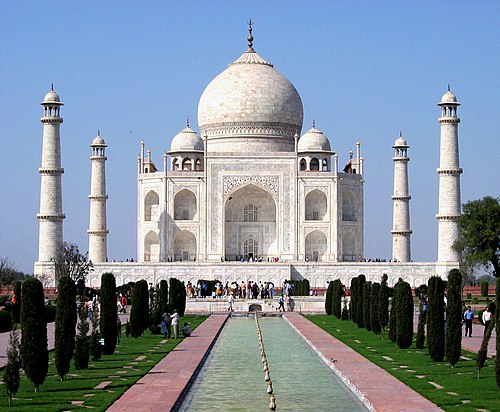Monumentnoun
A structure built for commemorative or symbolic reasons, or as a memorial; a commemoration.
Monumentnoun
An important site owned by the community as a whole.
Monumentnoun
An exceptional or proud achievement.
Monumentnoun
An important burial vault or tomb.
Monumentnoun
A legal document.
Monumentnoun
A surveying reference point marked by a permanently fixed marker (a survey monument).
Monumentnoun
Something which stands, or remains, to keep in remembrance what is past; a memorial.
Monumentnoun
A building, pillar, stone, or the like, erected to preserve the remembrance of a person, event, action, etc.; as, the Washington monument; the Bunker Hill monument. Also, a tomb, with memorial inscriptions.
Monumentnoun
A stone or other permanent object, serving to indicate a limit or to mark a boundary.
Monumentnoun
A saying, deed, or example, worthy of record.
Monumentnoun
a structure erected to commemorate persons or events
Monumentnoun
an important site that is marked and preserved as public property
Monumentnoun
a burial vault (usually for some famous person)
Monumentnoun
a statue, building, or other structure erected to commemorate a notable person or event
Monumentnoun
a statue or other structure placed over a grave in memory of the dead
Monumentnoun
a building, structure, or site that is of historical importance or interest
Monumentnoun
an enduring and memorable example of something
Monument
A monument is a type of structure that was explicitly created to commemorate a person or event, or which has become relevant to a social group as a part of their remembrance of historic times or cultural heritage, due to its artistic, historical, political, technical or architectural importance. Some of the first monuments were dolmens or menhirs, megalithic constructions built for religious or funerary purposes.
Landmarknoun
A recognizable natural or man-made feature used for navigation.
Landmarknoun
A notable location with historical, cultural, or geographical significance.
Landmarknoun
A major, important event.
Landmarkverb
(US) To officially designate a site or building as a landmark.
Landmarknoun
A mark to designate the boundary of land; any mark or fixed object (as a marked tree, a stone, a ditch, or a heap of stones) by which the limits of a farm, a town, or other portion of territory may be known and preserved.
Landmarknoun
Any conspicuous object on land that serves as a guide; some prominent object, as a hill or steeple.
Landmarknoun
A structure that has special significance, such as a building with historical associations;
Landmarknoun
An event or accomplishment of great significance; as, Brown v. Board of Education was a landmark of the civil rights movement. Also used attributively, as a landmark court decision.
Landmarknoun
the position of a prominent or well-known object in a particular landscape;
Landmarknoun
an event marking a unique or important historical change of course or one on which important developments depend;
Landmarknoun
a mark showing the boundary of a piece of land
Landmarknoun
an anatomical structure used as a point of origin in locating other anatomical structures (as in surgery) or as point from which measurements can be taken
Landmarknoun
an object or feature of a landscape or town that is easily seen and recognized from a distance, especially one that enables someone to establish their location
Landmarknoun
a building or monument of historical importance
Landmarknoun
the boundary of an area of land, or an object marking this
Landmarknoun
an event or discovery marking an important stage or turning point in something
Landmark
A landmark is a recognizable natural or artificial feature used for navigation, a feature that stands out from its near environment and is often visible from long distances. In modern use, the term can also be applied to smaller structures or features, that have become local or national symbols.

































